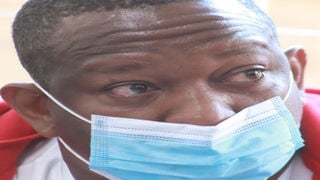
Former Nairobi Governor Mike Sonko at the anti-corruption court in Milimani Nairobi on February 3, 2021.
| File | Nation Media GroupNews
Premium
Sonko and VIP suspects who leave cold police cells for exclusive hospital suites
In the North Wing ward at the Nairobi Hospital, former Nairobi governor Mike Sonko has his own room with a telephone, writing desk, bible, wardrobe and a couch.
Every morning he gets a newspaper of his choice, soft drinks of his liking - unless he is on a diet – and a menu to select what he wants to eat for lunch and supper.
Nairobi Hospital, where the former governor is admitted, is one of the best private medical facilities, but patients pay through the nose.

Mike Sonko being driven to Nairobi Hospital for treatment on February 9, 2021.
It is a far cry from the cold cells of Gigiri Police Station, where his VIP status only afforded him his own cell in the basement of an old government facility.
That Sonko, a maverick who defied all the odds in his race to the helm of East Africa’s commercial capital before tumbling down, is going through one of the toughest moments of his career is not in doubt.
His release to undergo treatment was a major reprieve from the government’s security machinery, which treated him like an enemy of the State.
Unlike Gigiri Police Station, where visits had been restricted by the government, his interaction with the public is now controlled by Nairobi Hospital’s policy, which is not strict.
The only thing that would remind him that he is still a remandee of the state are the police officers stationed outside his ward.
Beyond the door to his ward, however, Sonko is like all the patients at the Nairobi Hospital, only that his stay there has been permitted by a magistrate.
"I do not have good news as my client is still admitted to Nairobi Hospital because of cardiac problems and high blood pressure, among other conditions," Sonko’s lawyer John Khaminwa told the court on Wednesday after the magistrate demanded an explanation on the medical condition of the former governor.
While it is everyone’s right to get medical attention, cases of VIP suspects being allowed by the courts to stay in hospital are not uncommon.
Most of these orders, which follow lawyers’ applications, are increasingly transforming hospitals into VIP cells.
Lawyers say it is within the powers of a magistrate or judge to decide if a suspect should be taken to a hospital, but there must be evidence of sickness.
“The constitution guarantees everyone a right to medical care,” says Mr Jonnes Nyachiro, a lawyer.
“Before such an order is made, the judge must see medical evidence that a suspect is sick. Such evidence must show what tests have been done. What is happening, however, is that some people are misusing the law in order to get unnecessary advantage,” he says.
Surprisingly, it is only VIP suspects who manage to get such orders, which enable them to stay at hospitals of their choice. And even when such a suspect is taken to a public facility, they always get admitted to the private wings.
“They enjoy hotel lives in those hospitals. Poor people who are in government custody are taken to Kenyatta National Hospital (KNH) and then taken back to prison,” observes human rights activist Boniface Mwangi.
“The government has its own doctors and hospitals. The magistrates and judges who are giving these orders are committing illegalities,” he argues.
Former Youth Affairs Principal Secretary Lilian Omollo spent two weeks in the private wing of KNH after she collapsed in court during the hearing of the Sh8 billion National Youth Service (NYS) scandal case.

Former Youth Affairs Permanent Secretary Lilian Mbogo-Omollo.
As her fellow suspects were whisked away to be remanded in prisons in June 2018, Ms Omollo was driven in an ambulance to KNH, where she was stretchered to the 10th floor.
Although she was eventually sent back to Langata Women’s Prison following complaints from the Director of Public Prosecution, she only spent a week in remand, before getting Sh1 million cash bail. Her 42 co-suspects were unlucky, as they spent a combined three weeks in prison as the court processed their bail applications.
One of Sonko’s lawyers, Mr Assa Nyakundi, similarly stayed at the Nairobi Hospital for six weeks on account of being sick after he was arrested for the shooting of his son Joseph.
At that time, Mr Nyakundi’s lawyers argued before the court that their client was suffering from high blood pressure and was too incoherent to even record a statement.
The Directorate of Criminal Investigations (DCI) tried to get custodial orders from the court but were told at every try that a suspect cannot be placed in custody if he is not in front of a judge to hear him out.
By the time Mr Nyakundi was released from hospital, he was no longer a suspect in the murder of his son. He was charged with manslaughter, a charge the Director of Public Prosecutions (DPP) has been trying to overturn for a whole year.
On Tuesday, the DPP finally got his wish after Justice Daniel Ogembo dismissed Mr Nyakundi’s application seeking to stop top prosecutor Noordin Haji from charging him with the murder of his son. While dismissing Mr Nyakundi’s case, the judge said the DPP was merely acting in the interest of the public.
“I have not been shown how or in which way the DPP has acted against these constitutional tenets under Article 157(II). On my part I see none,” said Justice Ogembo.
Other VIPs who have in the past managed to get orders admitting them into hospitals instead of prison cells include Goldenberg scandal architect Kamlesh Pattni and his business partners Ketan Somaia and Wellington Joshua Oluga.
In January 2005, at the height of investigations into the Goldenberg scandal, Mr Pattni and his co-accused stayed at the Nairobi Hospital for months, forcing Commissioner of Prisons Abraham Kamakil to issue orders returning them to Kamiti Prison.
Former Kiambu governor Ferdinand Waititu recently attempted to cite sickness in order not to attend a court hearing but the judge ordered that he undergo medical tests by three government doctors.
Lawyer Jonnes Nyakundi argues that there ought to be a policy on how suspects who fall sick get treatment as long as they are in government custody.
This policy will guide magistrates and judges on what to do if a suspect falls sick before a plea has been taken.
“I know legislators will not push for such a law because they know at one point in their lives they may fall afoul of the law,” he says.





